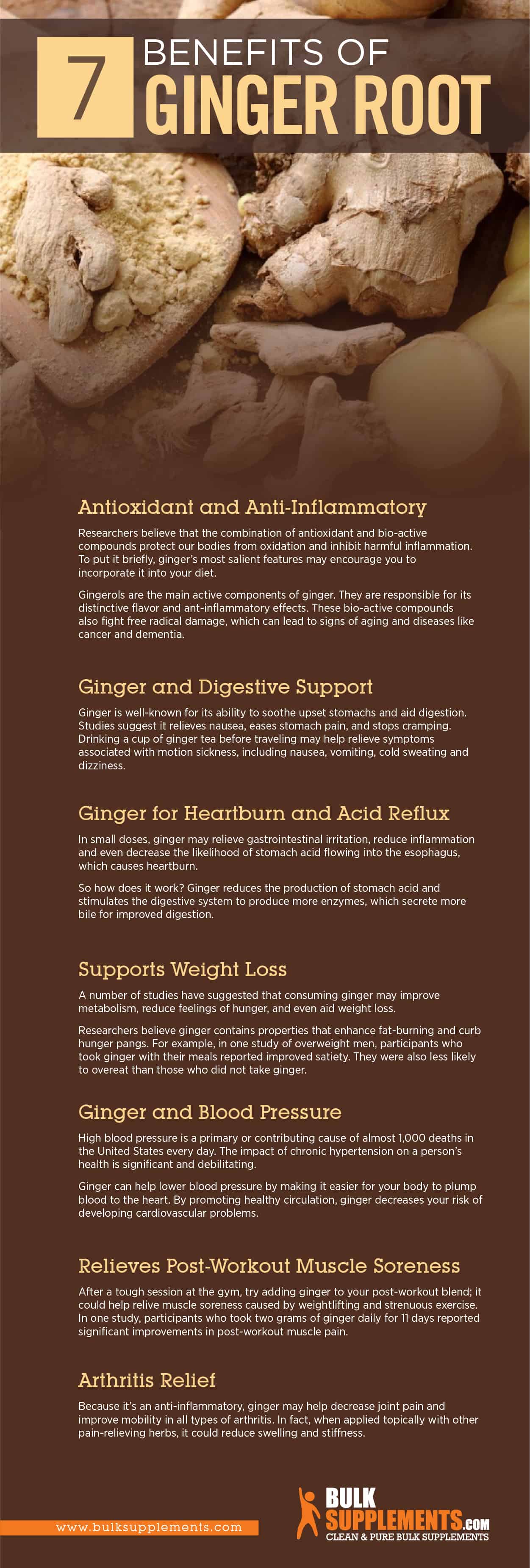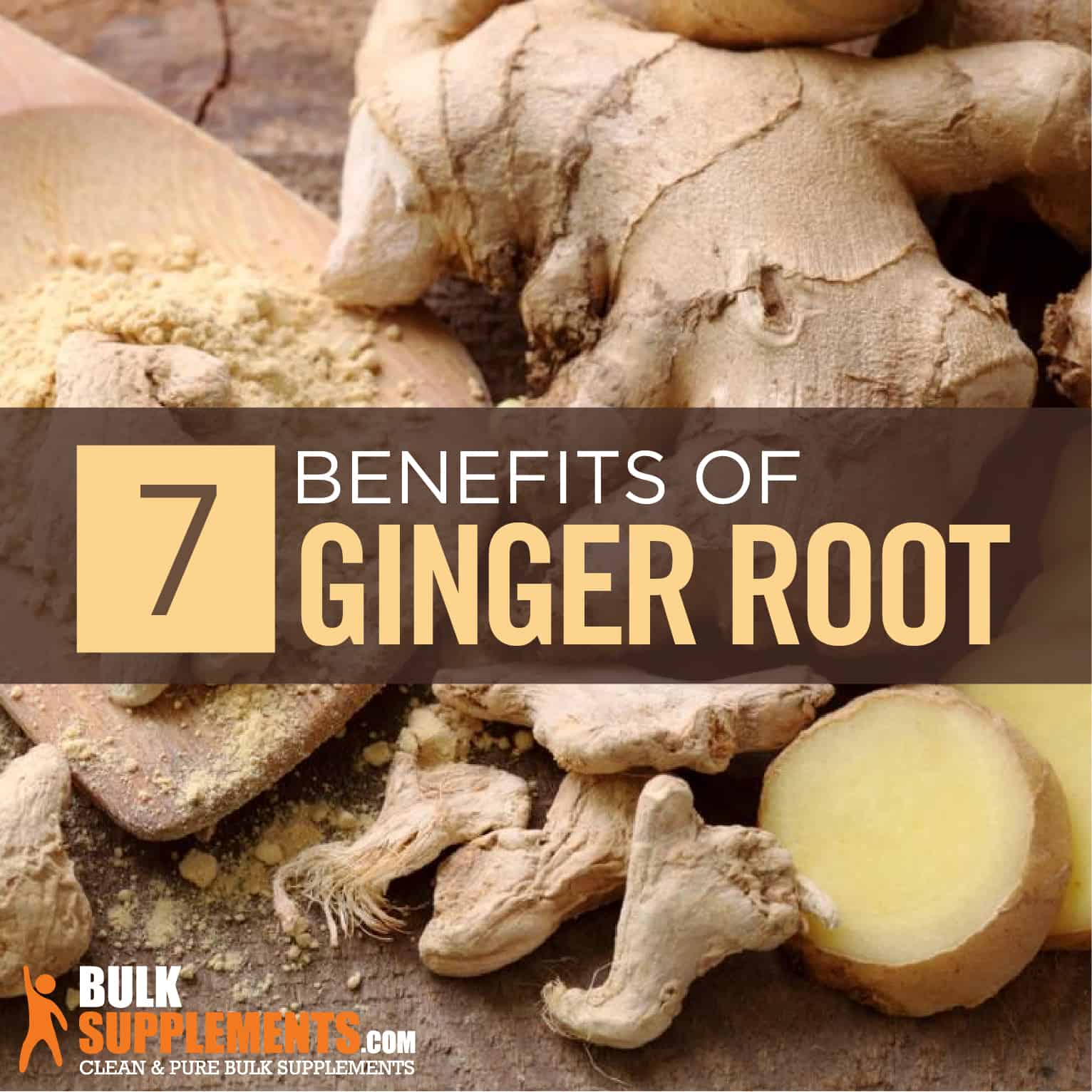What Is Ginger Root?
Ginger originated in Southeast Asia and is now widely cultivated throughout the world. A powerful antioxidant and anti-inflammatory agent, it’s a natural remedy for nausea, indigestion and stomach pain. It may also reduce menstrual pain and strengthen the immune system.
Like its relative spices, cardamon and turmeric, ginger is a flowering plant that belongs to the Zingiberaceae family. As an herbal supplement, ginger root extract contains more than 100 active compounds with powerful health benefits. Indeed, ginger may be the key to vibrant health and a slim figure.
Benefits of Ginger
Antioxidant and Anti-Inflammatory
Researchers believe that the combination of antioxidant and bio-active compounds protect our bodies from oxidation and inhibit harmful inflammation (x). To put it briefly, ginger’s most salient features may encourage you to incorporate it into your diet.
Gingerols are the main active components of ginger. They are responsible for its distinctive flavor and ant-inflammatory effects. These bio-active compounds also fight free radical damage, which can lead to signs of aging and diseases like cancer and dementia (x, x).
Ginger and Digestive Support
Ginger is well-known for its ability to soothe upset stomachs and aid digestion. Studies suggest it relieves nausea, eases stomach pain, and stops cramping (x). Drinking a cup of ginger tea before traveling may help relieve symptoms associated with motion sickness, including nausea, vomiting, cold sweats and dizziness (x).
Ginger can also help alleviate nausea and vomiting associated with morning sickness, as well as general nausea caused by pregnancy (x). Additionally, studies show ginger reduces chemotherapy-induced nausea and vomiting (x).
Ginger for Heartburn and Acid Reflux
In small doses, ginger may relieve gastrointestinal irritation, acid reflux and even decrease the likelihood of stomach acid flowing into the esophagus, which causes heartburn (x).
So how does it work? Ginger reduces the production of stomach acid and stimulates the digestive system to produce more enzymes, which secrete more bile for improved digestion (x).
Supports Weight Loss
A number of studies have suggested that consuming ginger may improve metabolism, reduce feelings of hunger, and even aid weight loss (x).
Researchers believe ginger contains properties that enhance fat-burning and curb hunger pangs (x). For example, in one study of overweight men, participants who took ginger with their meals reported improved satiety. They were also less likely to overeat than those who did not take ginger (x).
Ginger and Blood Pressure
High blood pressure is a primary or contributing cause of almost 1,000 deaths in the United States every day (x). The impact of chronic hypertension on a person’s health is significant and debilitating.
Ginger can help lower blood pressure by making it easier for your body to plump blood to the heart (x). By promoting healthy circulation, ginger decreases your risk of developing cardiovascular problems.
Natural herbs, however, shouldn’t always be used in place of medication your doctor prescribes you for a heart condition. Always talk to your doctor before adding any supplements to your nutrition routine, especially if you’re taking them for serious health conditions like heart disease.
Relieves Post-Workout Muscle Soreness
After a tough session at the gym, try adding ginger to your post-workout blend; it could help relive muscle soreness caused by weightlifting and strenuous exercise (x). In one study, participants who took two grams of ginger daily for 11 days reported significant improvements in post-workout muscle pain (x).
Arthritis Relief
Because it’s an anti-inflammatory, ginger may help decrease joint pain and improve mobility in all types of arthritis (x). In fact, when applied topically with other pain-relieving herbs, it could reduce swelling and stiffness (x).
Ginger Benefits for Skin
Ginger improves collagen production and contains around 40 antioxidant compounds that reduce skin damage and inflammation (x).
Collagen is the chemical that gives skin its elasticity. Without collagen, skin becomes fragile and vulnerable to injury. The anti-oxidative effect of ginger may help slow the natural breakdown of collagen and reduce the impact of damage caused by sun exposure (x). This in turn could minimize signs of aging like wrinkles, discoloration and sagging skin. Ginger may also improve the appearance of scars (x).

Did You Know?
- The roots of turmeric and ginger typically have the same bulbous shape.
- Ginger was an extremely valuable commodity in Europe after the fall of the Roman Empire (x).
- Traders first brought ginger to the Middle East from India in the first century C.E.
Culinary Ginger
Available fresh or in powdered form, ginger is a popular spice in Asian, Middle Eastern and Indian cuisine. It’s a staple ingredient in many traditional Chinese dishes and offers a pungent, subtle kick to smoothies, meats, and stir-fried vegetables, and more. It’s also available in teas and herbal blends.
Ginger Side Effects
The side effects of ginger are minimal for healthy adults who adhere to the recommended dosage. Some mild side effects of ginger root include heartburn, abdominal discomfort, and throat irritation.
Talk to your doctor before adding ginger or a ginger supplement to your diet if you have a bleeding disorder, as it may increase your risk of bleeding. You should also talk to your doctor before taking ginger if you have diabetes, as it may increase your insulin levels or lower your blood sugar.
Even though there are no reports of toxic incidents from the consumption of ginger, use reasonable caution if you have underlying health conditions. Most importantly, always speak to your health care provider or pharmacist to ensure ginger won’t interact with any medications you may take.
Ginger Dosage
You can find ginger supplements available in several forms, including pills, capsules, herbal blends, teas and more. Equally, Ginger root extract powder contains a high concentration of the herb’s beneficial compounds and potent antioxidants. If you choose the powder, take 1,000 milligrams (about 1/2 tsp) once daily, or as directed by your physician. More importantly, to avoid potential heartburn, take with at least 8 ounces of water. At any ate, you can also mix the powder into tea, smoothies, juices or the beverage of your choice.
Adults should limit their intake of ginger root to no more than 4 grams of ginger root a day to avoid bloating, gas, or heartburn. Children between the ages of 2 and 6 should not consume more than 2 milligrams of ginger root daily.
Pregnant women seeking relief from nausea, morning sickness, motion sickness, or vomiting, should consult with a doctor for the proper dosage (x).
The Bottom Line
An ancient remedy for inflammation, indigestion and more, ginger has been a remedy for a variety of health complaints. Rich in antioxidants, it keeps your skin firm and youthful, relieves pregnancy and chemotherapy-induced nausea and reduces arthritis-related inflammation. In fact, it could help you get back to the gym faster by reducing post-workout muscle soreness. You can find ginger in the form of a tea, powder, or extract. Above all, ginger has been a staple in herbal health for centuries for good reason – it has science in its corner to back up its many benefits.
By: Angel Woodyard


